Chuheng Zhang
ChatAD: Reasoning-Enhanced Time-Series Anomaly Detection with Multi-Turn Instruction Evolution
Jan 20, 2026Abstract:LLM-driven Anomaly Detection (AD) helps enhance the understanding and explanatory abilities of anomalous behaviors in Time Series (TS). Existing methods face challenges of inadequate reasoning ability, deficient multi-turn dialogue capability, and narrow generalization. To this end, we 1) propose a multi-agent-based TS Evolution algorithm named TSEvol. On top of it, we 2) introduce the AD reasoning and multi-turn dialogue Dataset TSEData-20K and contribute the Chatbot family for AD, including ChatAD-Llama3-8B, Qwen2.5-7B, and Mistral-7B. Furthermore, 3) we propose the TS Kahneman-Tversky Optimization (TKTO) to enhance ChatAD's cross-task generalization capability. Lastly, 4) we propose a LLM-driven Learning-based AD Benchmark LLADBench to evaluate the performance of ChatAD and nine baselines across seven datasets and tasks. Our three ChatAD models achieve substantial gains, up to 34.50% in accuracy, 34.71% in F1, and a 37.42% reduction in false positives. Besides, via KTKO, our optimized ChatAD achieves competitive performance in reasoning and cross-task generalization on classification, forecasting, and imputation.
How Do VLAs Effectively Inherit from VLMs?
Nov 10, 2025Abstract:Vision-language-action (VLA) models hold the promise to attain generalizable embodied control. To achieve this, a pervasive paradigm is to leverage the rich vision-semantic priors of large vision-language models (VLMs). However, the fundamental question persists: How do VLAs effectively inherit the prior knowledge from VLMs? To address this critical question, we introduce a diagnostic benchmark, GrinningFace, an emoji tabletop manipulation task where the robot arm is asked to place objects onto printed emojis corresponding to language instructions. This task design is particularly revealing -- knowledge associated with emojis is ubiquitous in Internet-scale datasets used for VLM pre-training, yet emojis themselves are largely absent from standard robotics datasets. Consequently, they provide a clean proxy: successful task completion indicates effective transfer of VLM priors to embodied control. We implement this diagnostic task in both simulated environment and a real robot, and compare various promising techniques for knowledge transfer. Specifically, we investigate the effects of parameter-efficient fine-tuning, VLM freezing, co-training, predicting discretized actions, and predicting latent actions. Through systematic evaluation, our work not only demonstrates the critical importance of preserving VLM priors for the generalization of VLA but also establishes guidelines for future research in developing truly generalizable embodied AI systems.
villa-X: Enhancing Latent Action Modeling in Vision-Language-Action Models
Jul 31, 2025Abstract:Visual-Language-Action (VLA) models have emerged as a popular paradigm for learning robot manipulation policies that can follow language instructions and generalize to novel scenarios. Recent work has begun to explore the incorporation of latent actions, an abstract representation of visual change between two frames, into VLA pre-training. In this paper, we introduce villa-X, a novel Visual-Language-Latent-Action (ViLLA) framework that advances latent action modeling for learning generalizable robot manipulation policies. Our approach improves both how latent actions are learned and how they are incorporated into VLA pre-training. Together, these contributions enable villa-X to achieve superior performance across simulated environments including SIMPLER and LIBERO, as well as on two real-world robot setups including gripper and dexterous hand manipulation. We believe the ViLLA paradigm holds significant promise, and that our villa-X provides a strong foundation for future research.
PIG-Nav: Key Insights for Pretrained Image Goal Navigation Models
Jul 23, 2025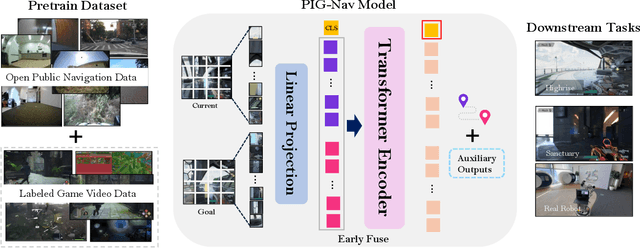

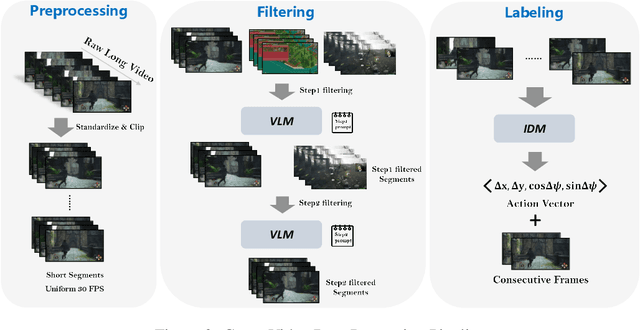

Abstract:Recent studies have explored pretrained (foundation) models for vision-based robotic navigation, aiming to achieve generalizable navigation and positive transfer across diverse environments while enhancing zero-shot performance in unseen settings. In this work, we introduce PIG-Nav (Pretrained Image-Goal Navigation), a new approach that further investigates pretraining strategies for vision-based navigation models and contributes in two key areas. Model-wise, we identify two critical design choices that consistently improve the performance of pretrained navigation models: (1) integrating an early-fusion network structure to combine visual observations and goal images via appropriately pretrained Vision Transformer (ViT) image encoder, and (2) introducing suitable auxiliary tasks to enhance global navigation representation learning, thus further improving navigation performance. Dataset-wise, we propose a novel data preprocessing pipeline for efficiently labeling large-scale game video datasets for navigation model training. We demonstrate that augmenting existing open navigation datasets with diverse gameplay videos improves model performance. Our model achieves an average improvement of 22.6% in zero-shot settings and a 37.5% improvement in fine-tuning settings over existing visual navigation foundation models in two complex simulated environments and one real-world environment. These results advance the state-of-the-art in pretrained image-goal navigation models. Notably, our model maintains competitive performance while requiring significantly less fine-tuning data, highlighting its potential for real-world deployment with minimal labeled supervision.
Reward-Driven Interaction: Enhancing Proactive Dialogue Agents through User Satisfaction Prediction
May 24, 2025Abstract:Reward-driven proactive dialogue agents require precise estimation of user satisfaction as an intrinsic reward signal to determine optimal interaction strategies. Specifically, this framework triggers clarification questions when detecting potential user dissatisfaction during interactions in the industrial dialogue system. Traditional works typically rely on training a neural network model based on weak labels which are generated by a simple model trained on user actions after current turn. However, existing methods suffer from two critical limitations in real-world scenarios: (1) Noisy Reward Supervision, dependence on weak labels derived from post-hoc user actions introduces bias, particularly failing to capture satisfaction signals in ASR-error-induced utterances; (2) Long-Tail Feedback Sparsity, the power-law distribution of user queries causes reward prediction accuracy to drop in low-frequency domains. The noise in the weak labels and a power-law distribution of user utterances results in that the model is hard to learn good representation of user utterances and sessions. To address these limitations, we propose two auxiliary tasks to improve the representation learning of user utterances and sessions that enhance user satisfaction prediction. The first one is a contrastive self-supervised learning task, which helps the model learn the representation of rare user utterances and identify ASR errors. The second one is a domain-intent classification task, which aids the model in learning the representation of user sessions from long-tailed domains and improving the model's performance on such domains. The proposed method is evaluated on DuerOS, demonstrating significant improvements in the accuracy of error recognition on rare user utterances and long-tailed domains.
AdaptiveStep: Automatically Dividing Reasoning Step through Model Confidence
Feb 19, 2025Abstract:Current approaches for training Process Reward Models (PRMs) often involve breaking down responses into multiple reasoning steps using rule-based techniques, such as using predefined placeholder tokens or setting the reasoning step's length into a fixed size. These approaches overlook the fact that specific words do not typically mark true decision points in a text. To address this, we propose AdaptiveStep, a method that divides reasoning steps based on the model's confidence in predicting the next word. This division method provides more decision-making information at each step, enhancing downstream tasks, such as reward model learning. Moreover, our method does not require manual annotation. We demonstrate its effectiveness through experiments with AdaptiveStep-trained PRMs in mathematical reasoning and code generation tasks. Experimental results indicate that the outcome PRM achieves state-of-the-art Best-of-N performance, surpassing greedy search strategy with token-level value-guided decoding, while also reducing construction costs by over 30% compared to existing open-source PRMs. In addition, we provide a thorough analysis and case study on the PRM's performance, transferability, and generalization capabilities.
Policy Filtration in RLHF to Fine-Tune LLM for Code Generation
Sep 11, 2024Abstract:Reinforcement learning from human feedback (RLHF) is one of the key techniques that helps large language models (LLMs) to follow instructions and provide helpful and harmless responses. While direct policy optimization methods exist, state-of-the-art LLMs adopt RL-based methods (usually PPO) in RLHF to train the policy to generate good responses guided by a reward model learned from preference data. The main challenge of these methods is the inaccuracy of the intermediate reward model, especially in code generation tasks that require long and complex reasoning to score a response. We find that the reliability of the reward model varies across responses assigned with different rewards. This motivates us to filter the samples whose rewards may be unreliable to improve signal-to-noise ratio during policy learning, resulting in Policy Filtration for Proximal Policy Optimization (PF-PPO). To choose a proper policy filtration strategy for a given reward model, the coefficient of determination ($R^2$) between rewards and actual scores on filtered samples serves as a good metrics and helps us find several promising strategies. We provide extensive experiments to validate the effectiveness of PF-PPO in code generation tasks, and find that some variants of PF-PPO are highly effective and achieve new state-of-the-art performance across 7-billion-parameter models on HumanEval, MBPP, and a new and more challenging LeetCode Contest benchmark.
Hard Prompts Made Interpretable: Sparse Entropy Regularization for Prompt Tuning with RL
Jul 20, 2024Abstract:With the advent of foundation models, prompt tuning has positioned itself as an important technique for directing model behaviors and eliciting desired responses. Prompt tuning regards selecting appropriate keywords included into the input, thereby adapting to the downstream task without adjusting or fine-tuning the model parameters. There is a wide range of work in prompt tuning, from approaches that directly harness the backpropagated gradient signals from the model, to those employing black-box optimization such as reinforcement learning (RL) methods. Our primary focus is on RLPrompt, which aims to find optimal prompt tokens leveraging soft Q-learning. While the results show promise, we have observed that the prompts frequently appear unnatural, which impedes their interpretability. We address this limitation by using sparse Tsallis entropy regularization, a principled approach to filtering out unlikely tokens from consideration. We extensively evaluate our approach across various tasks, including few-shot text classification, unsupervised text style transfer, and textual inversion from images. The results indicate a notable improvement over baselines, highlighting the efficacy of our approach in addressing the challenges of prompt tuning. Moreover, we show that the prompts discovered using our method are more natural and interpretable compared to those from other baselines.
Empowering Large Language Models on Robotic Manipulation with Affordance Prompting
Apr 17, 2024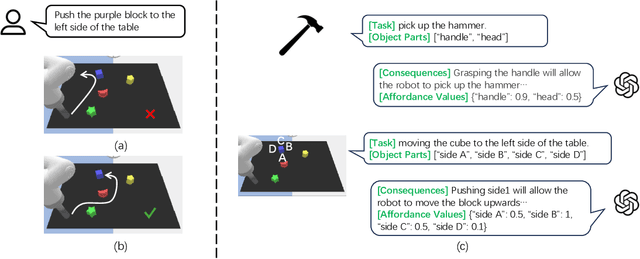
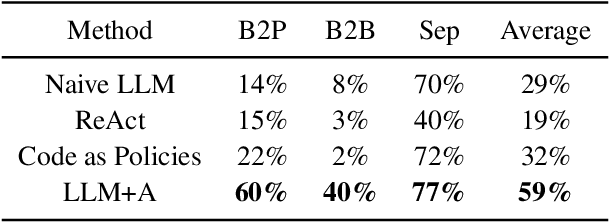
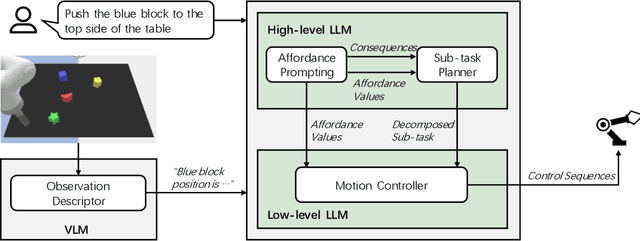
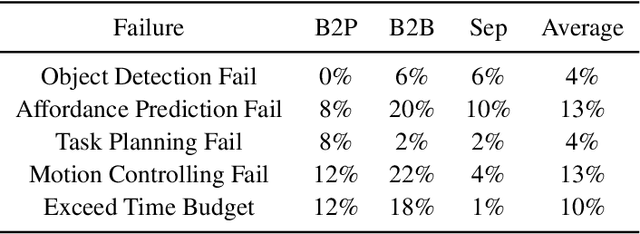
Abstract:While large language models (LLMs) are successful in completing various language processing tasks, they easily fail to interact with the physical world by generating control sequences properly. We find that the main reason is that LLMs are not grounded in the physical world. Existing LLM-based approaches circumvent this problem by relying on additional pre-defined skills or pre-trained sub-policies, making it hard to adapt to new tasks. In contrast, we aim to address this problem and explore the possibility to prompt pre-trained LLMs to accomplish a series of robotic manipulation tasks in a training-free paradigm. Accordingly, we propose a framework called LLM+A(ffordance) where the LLM serves as both the sub-task planner (that generates high-level plans) and the motion controller (that generates low-level control sequences). To ground these plans and control sequences on the physical world, we develop the affordance prompting technique that stimulates the LLM to 1) predict the consequences of generated plans and 2) generate affordance values for relevant objects. Empirically, we evaluate the effectiveness of LLM+A in various language-conditioned robotic manipulation tasks, which show that our approach substantially improves performance by enhancing the feasibility of generated plans and control and can easily generalize to different environments.
ARO: Large Language Model Supervised Robotics Text2Skill Autonomous Learning
Mar 23, 2024



Abstract:Robotics learning highly relies on human expertise and efforts, such as demonstrations, design of reward functions in reinforcement learning, performance evaluation using human feedback, etc. However, reliance on human assistance can lead to expensive learning costs and make skill learning difficult to scale. In this work, we introduce the Large Language Model Supervised Robotics Text2Skill Autonomous Learning (ARO) framework, which aims to replace human participation in the robot skill learning process with large-scale language models that incorporate reward function design and performance evaluation. We provide evidence that our approach enables fully autonomous robot skill learning, capable of completing partial tasks without human intervention. Furthermore, we also analyze the limitations of this approach in task understanding and optimization stability.
 Add to Chrome
Add to Chrome Add to Firefox
Add to Firefox Add to Edge
Add to Edge